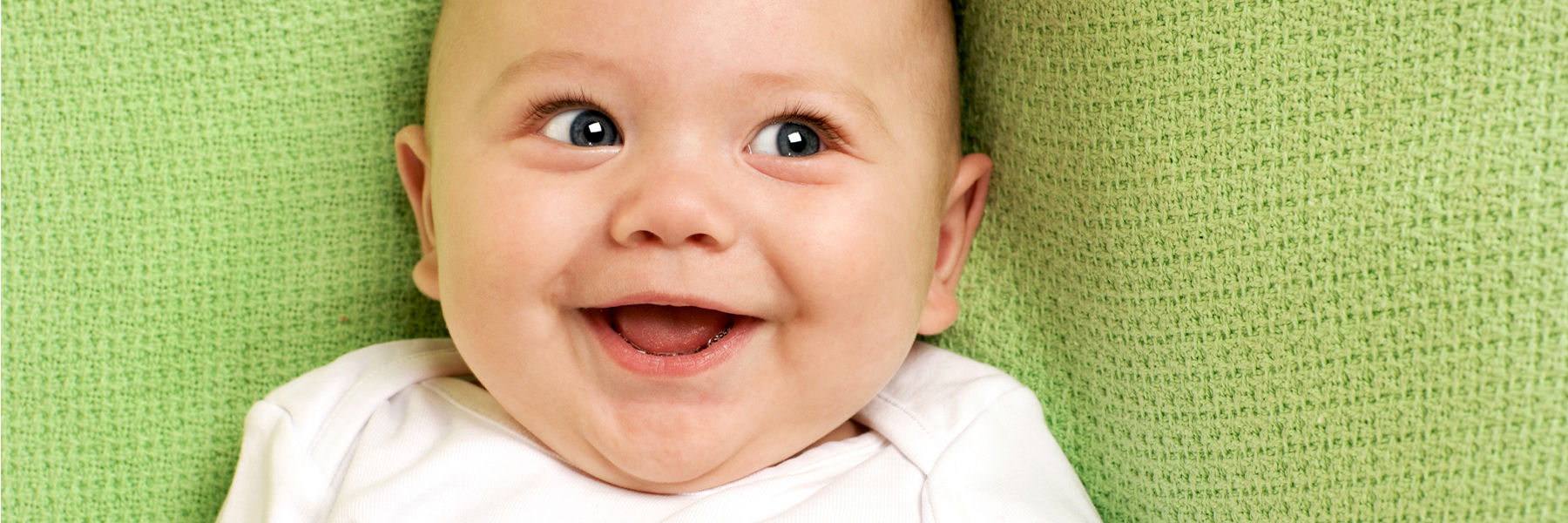Use arrow keys to navigate through the menu items. Use Tab key to navigate through the menu banners.
Baby Development

Baby Development
This super-cute stage is filled with so many memorable ‘firsts’ from rolling over to gorgeous giggles
In their first precious weeks your newborn will do little other than sleep, feed and cry. You’ll probably do much of the same, minus the sleep part! It’s an emotional time, but once you reach the 3-month mark, many babies will start to sleep longer stretches and feeding should get into more of a rhythm.
It’s around this time that you realise your teeny-tiny newborn isn’t quite so teeny-tiny any more. They’ve gained weight, got stronger and are ready to reach some amazing developmental milestones over the next 3 months.
‘This stage is certainly never boring!’ says postnatal practitioner, Claire Maguire (@baby.sleep.eat.help).
‘It’s not helpful to compare to others as every baby develops differently, although it can be tempting to do so,’ she says. ‘Instead try to focus on your relationship with your baby and the quality of your interactions as this has long-term benefits for them.’
From those first giggles to doubling their birth weight, here are some of the major milestones your baby may hit over the next few weeks or months. Buckle up for the ride!
Physical development milestones
Doing push-ups: During tummy time you may start to notice your baby lifting their head like a little push-up. This shows they’re getting stronger and are building up strength to be able to roll over, so watch out!
Rolling over: This may not happen until closer to the 6-month mark (or even after it) but some babies will be able to roll over from their back onto their front at this early age. Never leave them on the changing mat or on a sofa, just in case.
Putting things in their mouth: No longer just lying there taking things in, your baby will start discovering things like their feet and objects around them on the playmat. Once they can grab them, they’re likely to put them straight towards their mouth as their hand-eye coordination develops, so make sure your house is well baby proofed already.
Cutting their first tooth: Most babies start teething around 6 months but it can be as early as 4 months, says the NHS. Their bottom front teeth (incisors) are the first to appear, closely followed by their top front teeth, so look out for those perfect little pearly white pegs to appear any week now.
Being more upright: Around now you’ll find that your baby starts being able to sit, although they’ll need support from you or from cushions. It won’t be long before they can sit up unaided, even if they are a bit wobbly at first.
Doubling their birth weight: Around this age, many babies will reach a weight that’s double what they weighed at birth. This is quite a milestone and shows that your baby is thriving.
Cognitive and social development milestones
Making conversation: Those cute little babbles and gurgles are your baby’s way of chatting to you, trying to copy what you’re saying or practising what they can say. Clickable Words Talking to your baby as much as possible – even if you do feel a bit silly – can make a real difference to how they develop and learn.
First giggles: Hopefully you’ll already have witnessed your baby’s first smile, which can happen around 6-8 weeks. But try blowing a raspberry on their tummy during a nappy change or pulling a funny face and you may get a gorgeous giggle. Go on, it’ll make your day!
Feeding and motor skills
Getting ready to wean: Around this age you may notice your baby putting toys in their mouth and watching you when you eat. It’s possible they’re ready to start weaning (eating solids as opposed to just milk). NHS guidance is to wait until “around 6 months” before giving them solid food.
Grabbing your boob or bottle: Milk feeds may start to become more of a battle as your baby starts to grab or bat at your breast or the bottle as you offer it to them. They may also be more distracted at feeds so it can be helpful to turn off the TV or go somewhere quiet.
Should I be worried?
If your baby isn’t hitting these milestones yet, remember that all babies develop and do things at different times. However, if you are concerned about your baby’s development then do talk to your health visitor, GP or a private postnatal practitioner.
Toys to help your baby’s development
Baby books are not only a lovely way of bonding with your baby, but they’ll also teach your baby words, language and conversation skills even at this early age.
Baby playmats stimulate your baby’s senses with lights and sounds and help them strengthen and get ready for reaching, rolling and eventually crawling.
Interactive baby toys like rattles and things that beep, flash and play music are great for this age. They’ll stimulate your baby’s brain and encourage them to react and interact, helping social skills develop.
Help & Customer service
- Help Centre
- How to shop
- Product recalls
Payment Methodslist with 8 items
- Asda Group of Companies
- Modern Slavery Statement
- Electrical Waste Recycling
- Terms & Conditions
- Customer Review Policy
- Privacy Centre
- Cookie Settings
- Accessibility
© ASDA 2025